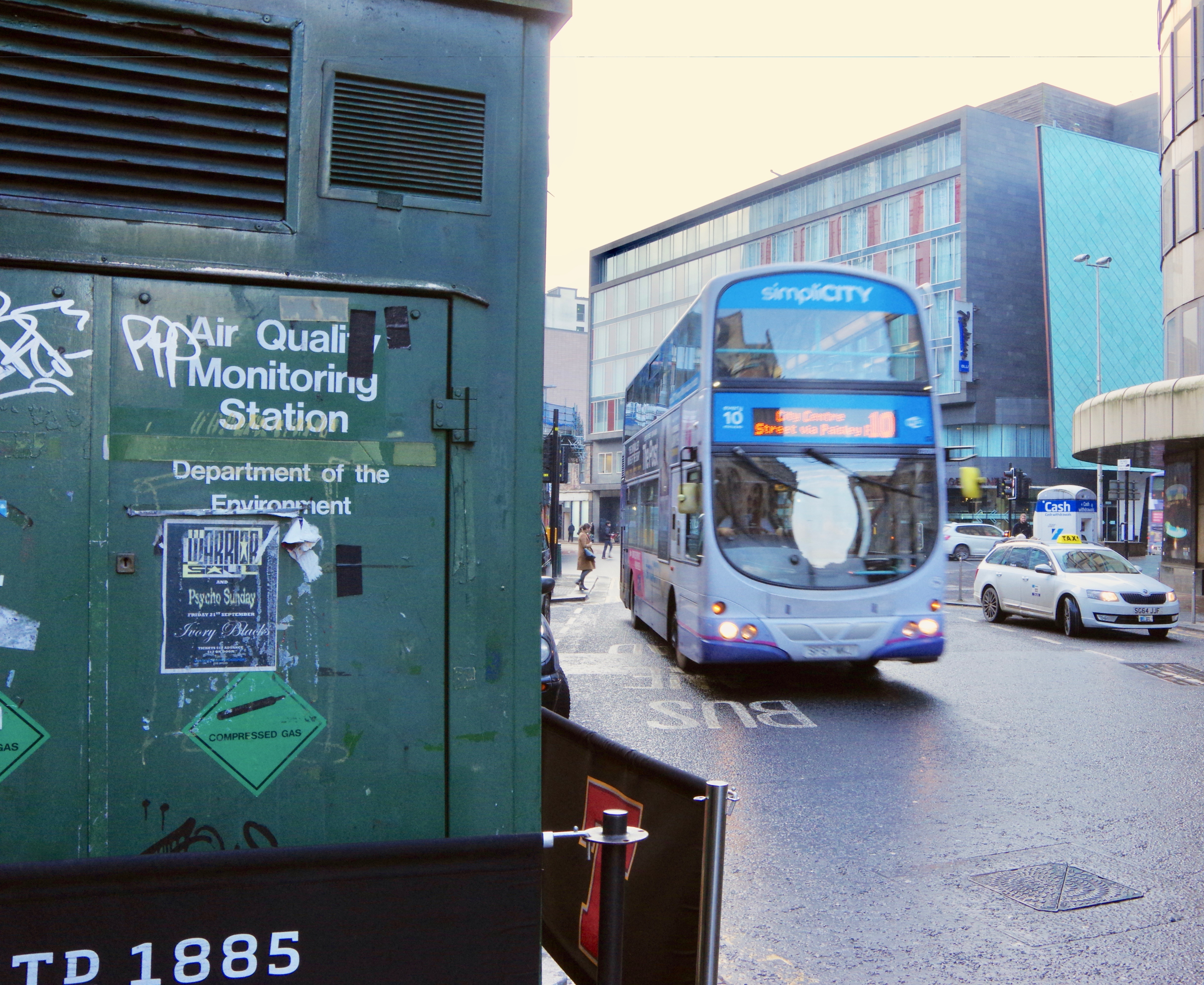
Bus companies refuse money to battle air pollution
A fund set up by the Scottish Government to improve older buses and reduce air pollution was snubbed by many bus operators, leaving millions unspent. The fund of £7.89million, closed on 8th March, having only given out £1million. The unspent £6.89million could have been used to clean up the bus fleet and protecting our health. Meanwhile, Scotland’s cities have illegal, toxic level of air pollution. Something stinks.
The money was made available by the Scottish Government to pay for retrofitting of buses, fitting new exhaust systems to filter out the pollution. In this way, older buses can be brought up to modern standards. On the two pollutants of most concern, upgrades to the oldest buses could reduce pollution by up to 90% for Nitrogen Dioxide, and half for fine particles. The exhaust upgrade costs could have converted around 500 buses. Instead, only 84 buses will be improved. Lothian Buses received funding to clean up 26 of their buses, while Xplore in Dundee will be improving 10 buses. This is barely scratching the surface.
2,500 early deaths are caused by air pollution in Scotland every year. The majority of buses in Scotland do not meet the latest standard, so we need big changes to our fleets. With measures such as Low Emission Zones being introduced in Glasgow, Edinburgh, Dundee and Aberdeen, bus companies need to upgrade. The fund was particularly targeted at Glasgow where the Low Emission Zone started operating at the beginning of this year.
So why did the money go unspent, and why are we still breathing toxic fumes?
Bus operators complained they weren’t getting enough money, claiming that schemes in England paid more. The Scottish Government said they were giving the most money they could while not breaking European State Aid rules. There appears to have been something of a stand-off between the biggest operators and the Government. This has resulted in millions going unspent and bus exhausts remaining more dangerous to health than they should be. Everyone loses.
Let’s hope more money is available next year, and bus operators reconsider their stubborn approach. Even if they did, that would be a year of unnecessary, avoidable pollution. Another year of preventable emissions from buses, of high levels of pollution, of more children suffering with asthma, and increased likelihood of strokes and heart attacks.
It’s worth keeping in mind the bus industry in Scotland gets £300m every year from the public purse, on concessionary fares and other services. In the last financial year, Stagecoach Group made £112.9m profit from its regional UK buses and FirstBus made £50m profit. Even in the context of declining bus passenger numbers, these are still huge sums of money being made, by some operators. The money that wasn’t used by bus operators won’t be “rolled over”, or given out to a different air quality project; it will go back into the general Scottish Government pot. A wasted opportunity, due to corporate greed.
What are Councils and Government doing about air pollution?
This scandal takes place at a time where we’re finally starting to see a spark of ambition in transport. Edinburgh Council’s City Centre Transformation Plan includes part-pedestrianisation of key streets, along with a car-free day on the first Sunday of every month. The Transport Bill currently working its way through Parliament includes franchising powers, to give local authorities greater control over buses.
Glasgow’s Low Emission Zone, launched on 31st December 2018, only required a tiny fraction of the city’s buses to be improved or replaced. The proportion of Glasgow’s buses that have to meet modern standards will gradually increase until 100% of buses are included in 2022. But Glaswegians will want to know why they’re waiting 4 years for cleaner air when millions are going unspent right now.
While we wait to see what the Low Emission Zones in Edinburgh, Aberdeen, and Dundee will look like, what areas the zones will cover, this disinterest from our large bus companies gives cause for alarm. Bus companies that are seriously committed to improving our air quality wouldn’t sit on their hands like this.
Bus passenger numbers are plummeting in the west of Scotland. Fares are rising – most minimum fares in Glasgow are now £2.40, compared to £1.70 on Lothian Buses – while routes are cut or shortened. But buses are a key tool, for air quality and reducing climate pollution. When a bus service is run effectively, that means scores of people can travel by bus rather than car. Fewer cars on the road means lower emissions.
Instead, companies seem happy to profit from older buses that continue to belch out toxic fumes on our streets. Because of their inaction, there’s been no improvement to air quality, and no change to the huge health impacts suffered from air pollution. We need big ideas and ambition to expand our bus network, but to start with, we need our bus operators to put people’s lives before their own profits.
Gavin Thomson is Air Pollution Campaigner at Friends of the Earth Scotland.
A version of this article appeared in The Scotsman on Wednesday 17 April.
Chip in to support our work to tackle air pollution.
